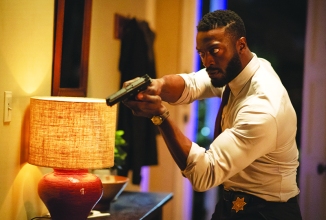Basketball drama gives Ben Affleck his most personal role yet

The Way Back
Starring Ben Affleck, Al Madrigal, Michaela Watkins & Janina Gavankar
Directed by Gavin O’Connor
R
In theaters Friday, March 6, 2020
In this hoop-dreams underdog tale, a washed-up former high-school basketball star comes back to his old alma mater to coach its ragtag team. Can he turn these losers into winners—and shake off the ghosts of his own troubled past?
OK, ok, ok—you’ve seen this movie before, right? But you really haven’t.
The Way Back sounds like a sports cliché. And it is, in a way that’s pretty unavoidable—especially for any movie that dares to step into the long shadow cast by the iconic Hoosiers (1986). But it’s actually structured around something else, a stirring human drama that transcends its basketball story.
Ben Affleck stars as Jack Cunningham, whom we meet on his dead-end construction job in Los Angeles. The first thing we learn about Jack is that he drinks—a lot. He sips during his lunch break. He pops a top in his pickup for the drive home. He gets hammered at a local back-alley pub with his buddies every night. He drinks in the shower as he scrubs off the grime of his job.
We learn that Jack’s sister (Michaela Watkins, who plays Delia on TV’s The Unicorn, and Ali on Get Shorty) is worried about him, his isolation and his excessive drinking; so is his ex-wife, Angela (Janina Gavankar, from The Morning Show).
Then we learn what a hotshot basketball player Jack used to be, back in the 1990s, when he played for a local Catholic high school and took them all the way to the state championship. That’s why he gets a phone call from the parish priest (John Aylward—remember him as Dr. Donald Anspaugh from TV’s ER?) asking him to come back as coach when an emergency leaves the school in a lurch just days before their first game.
 Jack doesn’t really want to take the gig; he tries to talk himself out of it in half a dozen ways one evening before running out of excuses (and beer), then showing up, somewhat reluctantly, the next morning for the job. That sets the movie’s wheels in motion, and we meet the capable, likeable assistant coach (comedian/actor Al Madrigal), and the team’s chaplain, Father Whelan (Jeremy Radin), who’s soon fighting a losing battle trying to reign in Jack’s salty language and his intensely competitive courtside behavior.
Jack doesn’t really want to take the gig; he tries to talk himself out of it in half a dozen ways one evening before running out of excuses (and beer), then showing up, somewhat reluctantly, the next morning for the job. That sets the movie’s wheels in motion, and we meet the capable, likeable assistant coach (comedian/actor Al Madrigal), and the team’s chaplain, Father Whelan (Jeremy Radin), who’s soon fighting a losing battle trying to reign in Jack’s salty language and his intensely competitive courtside behavior.
The team is a mixed bag, with barely just enough players to fill out the bench. Kenny (Will Ropp) is a smooth ladies’ man with the cheerleaders; the cocky Marcus (Melvin Gregg, from TV’s Snowfall) has chops, but an attitude that gets him in trouble; Brandon (Brandon Wilson) is held back by a situation at home that affects his performance on the court.
Where this is all headed won’t be surprising to anyone who’s ever watched any sports-themed movie. But again, this movie is about more than basketball. It’s about how Jack finds something—well, himself—on a journey that takes him back to a place where he started, which happens to be his old high school and its basketball court.

Janina Gavankar plays Jack’s ex-wife, Angela.
Why does Jack drink? What dark, almost bottomless emotional hole is he trying to fill? Why did he and Angie divorce? Why did Jack turn down a lucrative, full-ride basketball scholarship, walking away from the game that he once loved?
You’ll find out, eventually. And what you find out will probably dig deeper, and pull harder, on your heartstrings than you’ll likely see coming.
Director Gavin O’Connor worked previously with Affleck for The Accountant (2016), and he found the tender soul of the gritty martial-arts brother-vs.-brother boxing drama Warrior (2011), with Tom Hardy and Joel Edgerton. And he directed the rousing Miracle (2004), about the 1980 U.S. Hockey Team victory over the seemingly invincible Soviets. Here he has a feel not only for basketball—the scenes of high school games look raggedly authentic and genuine, instead of staged and overly dramatic—but also for the bigger, more personal, much more somber drama surrounding it. His early shots of Los Angeles depict a hazy, sprawling, faceless metroplex, which reflects the fog of Jack’s solitude and his booze-saturated apathy.
This is a very personal movie, as it turns out, for Affleck, who has been very forthcoming about his own struggles with alcohol and recovery over the past three years. He was in rehab, in fact, when the film was in pre-production. To say his performance feels authentic, honest, sometimes painful and lived-in is an understatement.
“We can’t change the past, Jack,” a counselor tells him. “What we can do is change how we move forward.”
The Way Back feels like an old-fashioned sports movie, a step back in a way, but also a step forward for a widely accomplished actor—who’s already won two Oscars, for directing (Argo), and screenwriting (Good Will Hunting)—with a statement about who he is, where he is now, and the kind of grownup, emotionally nuanced movies he’s interested in making.
It’s a movie that reminds us that life—like a basketball game—is almost always moving, sometimes very fast, that small decisions can often be the difference between losing and winning, and that little things matter greatly. Jack spurs his team—usually from behind—by telling them to keep up the pressure, that every little thing adds up, and to always be chipping away, chipping away.
“You worked hard to be here,” Jack tells the players at one point, just before a big game. “You earned this.” So has Ben Affleck, and it shows, perhaps in his most personal—and most personal-feeling—movie, and movie role, ever.
 The Invisible Man
The Invisible Man
